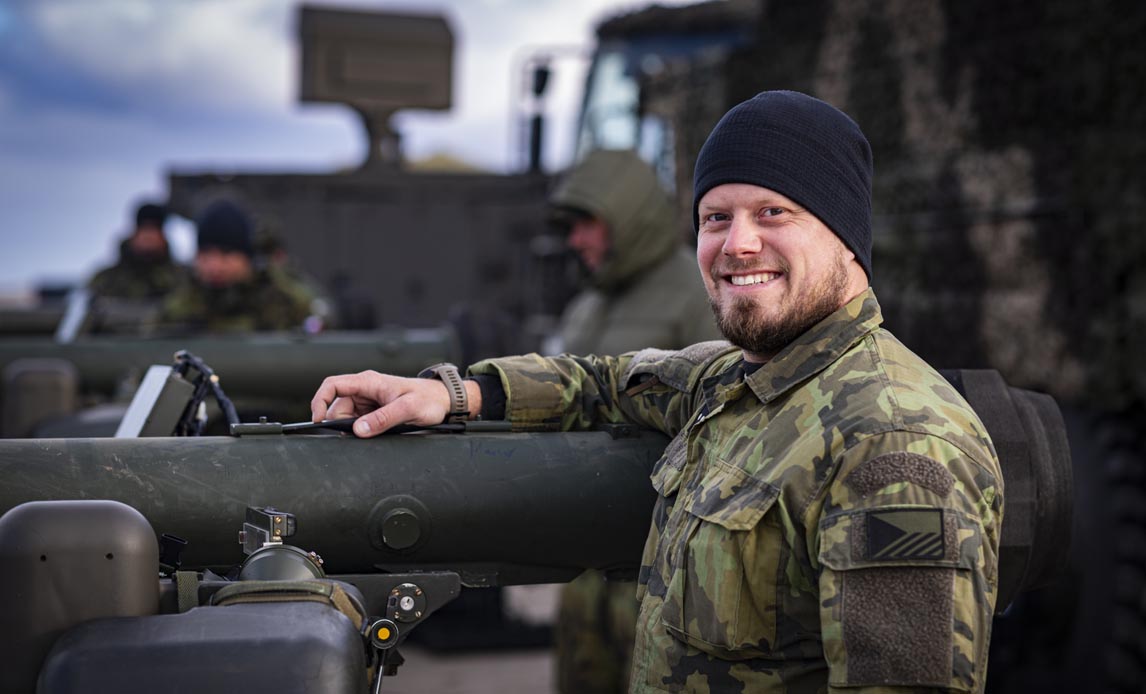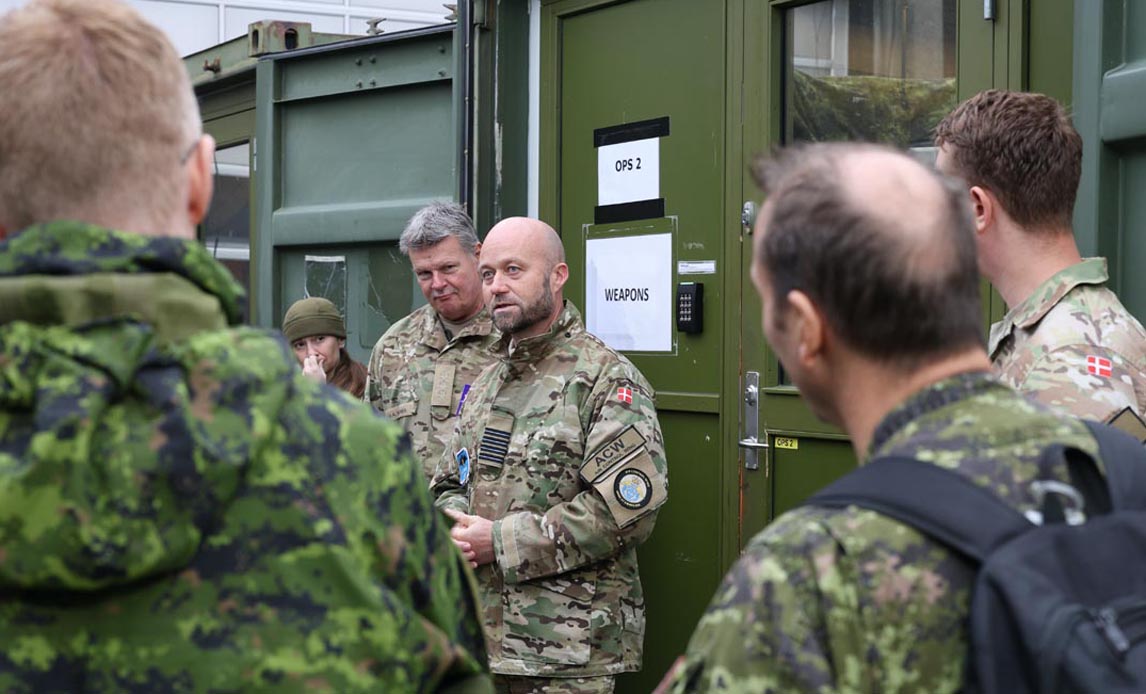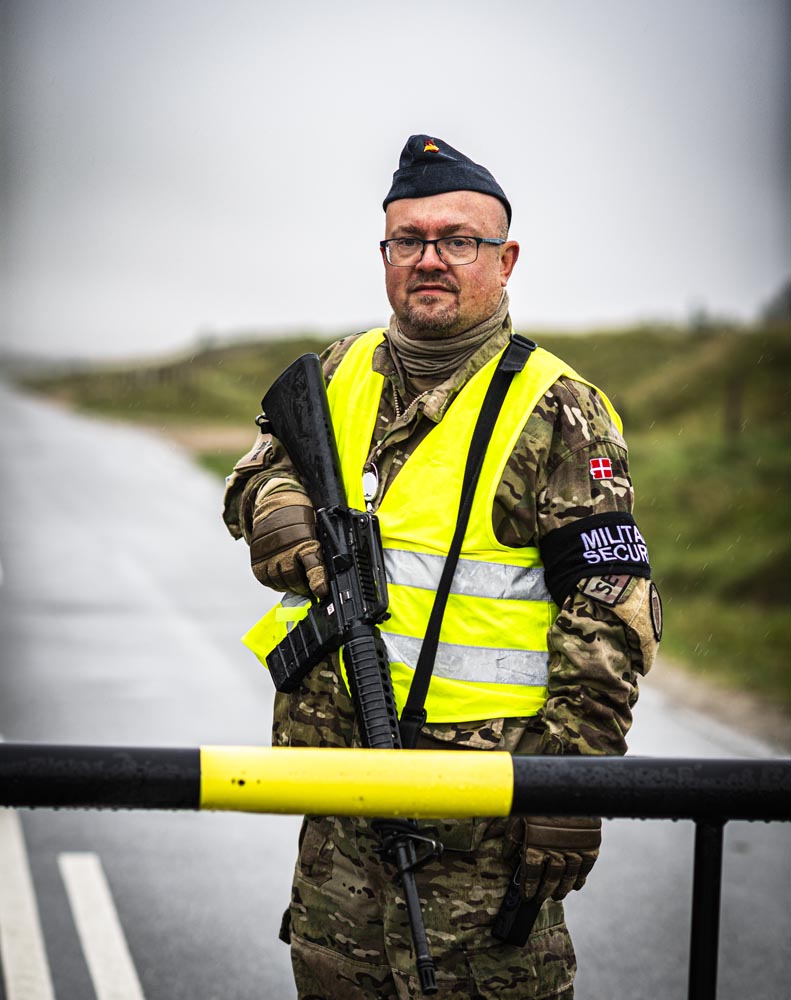A crucial part of aerial warfare has been tested in Denmark
The Danish Armed Forces hosted the activity BOLD QUEST last week, which took place at Oksbøl Barracks, Oksbøl Training Area, and over the North Sea. The activity involved various foreign ground units training their ability to identify friendly aircraft to avoid shooting down their own aircraft in a wartime situation.

Chech Air Force soldier in the Oksbøl training area. During the BOLD QUEST activity, they tested their ability to recognize friendly aircraft. Photo: Master Sailor Dan Bard / Directorate Army Public Affairs Canadian Armed Forces
By Sune Wadskjær Nielsen, the Danish Armed Forces
One of the worst mistakes that can occur in an armed conflict is shooting down one's own or allied combat aircraft. Near the Danish west coast in Oksbøl Barracks and in the Oksbøl training area, the Royal Danish Air Force and Air Control Wing hosted the American-led activity BOLD QUEST, where units from several NATO countries tested their ability to identify friendly aircraft that passed through the airspace over Oksbøl and the North Sea during the activity. Additionally, the ground units practiced and tested various interoperability scenarios. Over 12 nations participated in the activity, which began with preliminary tests on October 12-13, while the main focus and flight program of the activity took place from October 16 to 20, during which the deployed radars and sensors were tested with their respective systems. Air Control Wing Colonel Bjarke Lomborg, with the pilot call sign LOM, contributed to the test through a series of flights over the Oksbøl training area in a T-17 training aircraft.
"We are testing the interoperability between NATO units. At BOLD QUEST, it's Identification Friend or Foe (IFF) mode 5. In simple terms, it's a test of encrypted identification means that can be used to identify aircraft from one's own alliance," LOM explained.

Air Control Wing Colonel Bjarke Lomborg hosted the exercise's Distinguished Visitor Day and briefed the guests. Photo: Morten Fredslund / Forsvaret
In the Oksbøl training area, Canadian radar, American radar, and Czech and Norwegian missile units were set up. The ground units practiced intercepting the encrypted signals from the many different military aircraft that passed through the airspace over Oksbøl and the North Sea as part of the activity. All aspects of aircraft were involved, including combat aircraft, larger tanker aircraft, and smaller training aircraft. Captain Poulsen, an Danish Air Warfare Officer and Fighter Allocator, gained valuable experience from the exercise.
"We've had aircraft from most of Europe flying into the exercise area and receiving aerial refueling along the way. It's an extremely large setup we've been running," he said.
BOLD QUEST is a campaign held every six months by the US Joint Staff, either in the USA or with an allied or partner nation. The campaign is divided into several activities with a focus on different aspects of multinational cooperation that need to be developed and tested. The activity in Denmark had been planned for a long time and was not initiated due to the current situation in Ukraine. The Air Control Wing was the primary Danish participant and acted as the Host Nation for the entire activity, in terms of logistics, real-life support, and force protection.
"We have our mobile control center deployed here. We are controlling the airspace over Oksbøl with the aircraft participating in the activity here. They are collaborating with our main control center in Airbase Karup. It is a good opportunity for us to train the deployment of our mobile control center, which can also be used in an armed conflict," LOM said.
In addition to the Air Control Wing's participation, the Air Force also had T-17 training aircraft and an F-16 combat aircraft in the air over the training area, as well as the participation of the Operation Support Wing's Joint Data Link Operations Center and the Home Guard Aviation. Given the high level of activity in the air during an operation or at wartime, training is crucial.
"There can be a lot of aircraft in the air in a war zone, so it's extremely important to constantly have a complete situational awareness of what are our own aircraft and what is an enemy aircraft and thus a threat to our aircraft and our ground units," LOM explained.
Denmark as the host country
Another reason why the BOLD QUEST activity was important for the Royal Danish Air Force and Air Control Wing is that Denmark in a crisis or wartime situation has the role of host nation for allied forces heading to Eastern or Northern Europe. BOLD QUEST trained Denmark's ability to provide training and testing facilities for units before they are deployed in an operation. Captain Poulsen viewed BOLD QUEST as a highly relevant test.
"We are looking at how the future will be and how we expect the future battlefield to be. When we can test this in a safe environment, where we know how things work, it puts us in a significantly better position in the future. In light of what we see in Ukraine, it is extremely important that we become proficient in these matters so that we do not shoot down our own aircraft in a wartime situation," he said.

A part of Denmark's role in the BOLD QUEST activity was to provide host nation support. Soldiers from the Air Control Wing were responsible for force protection and, along with personnel from the Home Guard Aviation, kept unauthorized and curious individuals at a distance and performed access control. Photo: Master Sailor Dan Bard / Directorate Army Public Affairs Canadian Armed Forces
IFF 5 mode
IFF 5 is an encrypted signal that an aircraft emits and is detected by a ground unit (either a control center or an air defense system) with their radars or sensors, so they can identify it as a friendly aircraft.